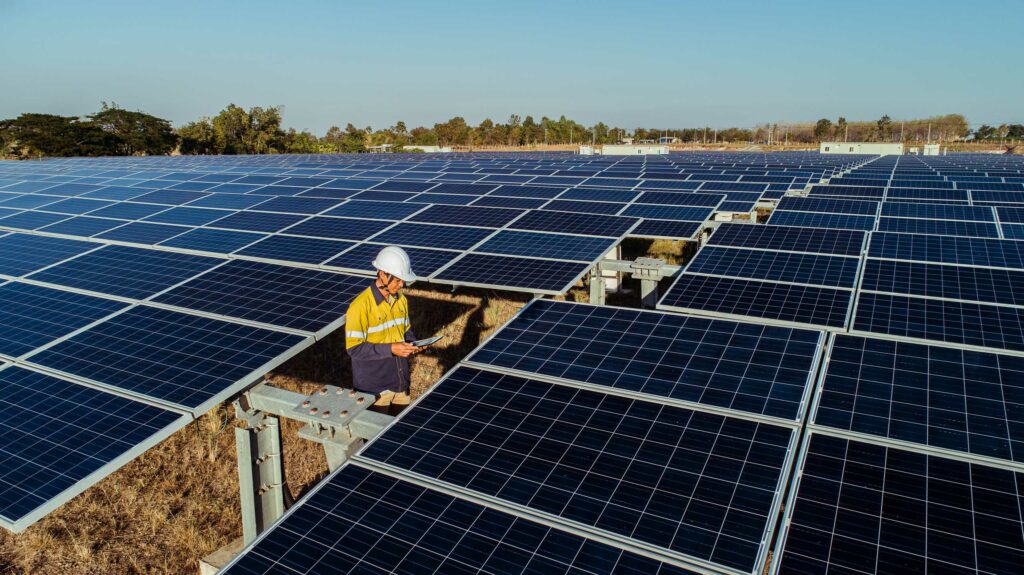CPPAs and Data Centres
Introduction
Data centres have quickly become a centre piece of conversation within the energy market. With the National Energy System Operator (NESO) in the UK projecting that energy demand from data centres will rise to an estimated 33 TWh by 2035 from 7.6TWh today in the UK alone.
Their exponential growth is reshaping the energy markets and policy landscapes. At the heart of transformation comes the Corporate Power Purchase Agreement (CPPA) offering a critical tool to enabling data centres to meet sustainability goals, securing long-term energy supply and hedging against future power price fluctuations.
CPPA Structures
CPPAs come in three main forms:
- Direct / Physical Purchase Power Agreement – a renewable energy project delivers the electricity generated directly to the corporate buyer, in this case the data centre.
- Virtual Purchase Power Agreement – operating similar to a CfD, the buyer and the generator agree a fixed price. If market prices exceed the fixed price the generator pays the difference to the buyer, however if the price falls below, the buyer compensates the generator.
- Sleeve Purchase Power Agreement – this involves three parties: generator > utility > corporate buyer. The role of the utility is to manage the offtake and grid delivery, charging a sleeve fee.
The CPPA contract structure varies by market and is shaped by local regulations for power sales and grid connection. In the US, deregulated power markets are typically more permissible to direct power sales between a generator and a customer. These markets often allow for direct physical power deliveries via both grid-connected and off-grid (behind the meter) solutions.
In contrast, regulated markets are typically characterised by vertically integrated and often monopolistic utilities. As a result, alternative contract structures may require different contract structures between an independent generator and customer. These markets may require power to be grid connected and often purchase through the utility, with the customer in turn receiving credits for the renewable energy, even if it isn’t physically delivered to the point of consumptions.

Why are CPPAs popular with data centres?
At present, the overall pipeline growth of data centres is increasing by 43% year on year, this is greatly down to the increase in AI workloads, cloud deployments and digital infrastructure expansion. As a result, the global demand is set to grow by an additional 200TWh per year between 2023 and 2030. To power this, Data centres’ electricity need has grown at an annual rate of 22.6% since 2015 which is far higher than the 0.4% growth of other sectors.
The repercussions of this growth have caused:
- Grid constraints – with grid bottlenecks throughout many markets including in Dublin where a moratorium has been established till 2028, forcing data centres to provide on-site or local generation.
- Renewable diversion – between 2017 and 2023, Ireland saw their additional renewable generation absorbed by data centres, which resulted in fossil generation seeing no net reduction. Effectively, data centres have been growing at such speed that they prevent renewables from truly displacing fossil fuels. If this patterns continues, Ireland’s climate commitments could seriously be challenged. This impact is not isolated to Ireland, however.
- Fossil reliance – dozens of centres in Ireland and the UK have sought to connect to natural gas generators in order to overcome power shortages and reliability. This highlights the limitations of renewable energy, despite an renewable energy mix for data centres would increase the reliability for each centre.
However, to power the continuous expansion of data centres, CPPAs offer a strategic response to this demand:
- Security of a stable price and supply assurance. Fixed pricing supports budgeting and hedges against market price volatility.
- Sustainability compliance and targets (e.g. RE100, etc.).
Well-known names have therefore been at the forefront of obtaining CPPAs including Amazon signing a 1.3TWh of energy contract with Windanker and Baltic Eagle offshore wind farms in Germany, Microsoft signing two CPPAs with Energia in Ireland and Google signing a 10 -year CPPA with Exus Renewables in Spain for 35MW from the Cascante wind farm.
Situation in Europe
Across Europe, governments are compelled to define or tighten their regulations towards data centres because of the high level of energy demand required by this infrastructure. In turn, CPPAs have become a signpost for adhering to both compliance and supporting decarbonisation.
- In Germany, the Energy Efficiency Act mandates datacentres to source 50% of their electricity from unsubsidized electricity from renewables by 2024, rising to 100% by 2027. Such legislation places datacentres at the centre of the commercial green power purchase market in Germany.
- In Ireland, the Commission for Regulation of Utilities has proposed a new electricity connection policy which requires new data centres to match their electricity demand with on-site or local generation and storage, while also reporting annually on renewable energy use and emissions. The hope of this piece of legislation is that the pressure on electricity supply will reduce.
- In the EU, the Energy Efficiency Directive has been focussed on reducing energy consumption and promoting energy efficiency within datacentres. This Directive seeks to mandate reporting on energy performance, prioritise use of renewable energy sources to reduce the carbon impact of the datacentre and optimise energy consumption.
This evolving legislative landscape is making CPPAs not just a strategic choice, but a necessary instrument for data centres to secure energy access, meet regulatory obligations and align with stakeholder expectations.
Challenges and Market Dynamics
However, despite the benefits that CPPA offer, this mechanism is complex. Only 10% of UK business have financial and legal capacity to purchase CPPAs.
Moreover, the relationship between data centres, CPPA and renewable energy projects is both a problem and part of the solution. Data centres are often framed as an extremely energy intensive, as highlighted throughout this piece, however, the demand that data centres require could be reframed to offer an opportunity within the renewable energy industry. Data centres can act as an anchor for new renewable projects, helping to underwrite their business case and enabling financing. The likely prospect of a long-term CPPA from a data centre can be a deciding factor in deploying future renewable energy projects. In this sense, data centres are beyond just customers for renewable energy projects but enablers within the transition.
The Future of CPPAs
CPPAs are evolving increasing lengths of contracts and structures are becoming more streamlined. In the UK, CPPAs are emerging as a genuine alternative route to market, in combination to CfDs. However, CPPAs alone cannot directly solve permitting delays, interconnection bottlenecks and other regulatory uncertainties that routinely disrupt the deployment of renewable energy generation capacity. Nor do they alone ensure fossil fuels will be phased out of the system.
Data centres will continue to grow inline with the global push towards AI and therefore energy will be needed to support this growth. Without faster deployment of renewable energy, fossil fuels will facilitate this growth. However, CPPAs offer a unique opportunity to act as anchor customers and support the business case for more renewable energy projects.
How can OWC Help?
OWC can support parties on both side of the equation: We can help power producers identify the datacentres, power demand, and market regulations, and integrate this into the business case for a project.
For datacentres owners and operators, we can estimate the required power consumption, design power systems and storage systems required, advise on procurement strategies, develop equipment specifications and employer requirements, and act as owner’s engineer to manage all work packages.
Connect with The Expert

Craig Brown
Head of Market Studies
